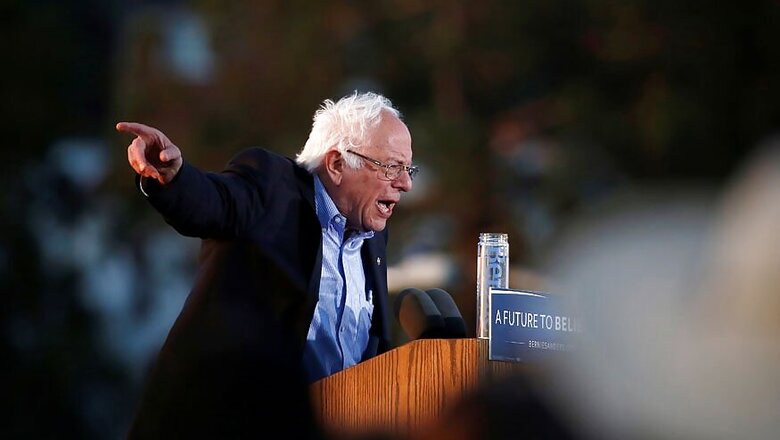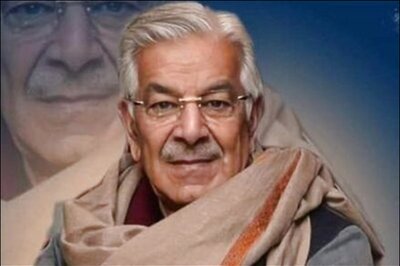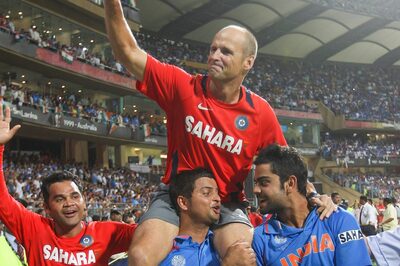
views
Burlington: The young woman on the political leaflet was smiling, but the message printed beside her in bold capital letters was severe. “The last two years,” it said, “have shown that those who made the revolution are not always the best to lead after the coup.”
To voters in Burlington, in 1983, the reference to Bernie Sanders was unmistakable.
What Democrats here were calling a coup was this: A young socialist had captured the mayor’s office two years earlier by a margin of just 10 votes, upending the political order in a comfortable lakeside city of about 38,000. For decades, an old-school Democratic machine had dominated municipal government. In 1983, the party intended to reclaim control by assailing Sanders’ “unkept promises.”
But in his reelection campaign that year, Sanders crushed the competition. Casting himself as a champion of the people against the establishment, Sanders summoned voters to the polls in unusual numbers. He triumphed over two opponents — one Democrat and one Republican — by more than 20 percentage points.
“No longer will they call my victory a fluke,” Sanders, then 41, wrote in a letter after the election, to a city-planning expert at Cornell University.
Answering a congratulatory message from a correspondent in Oregon, Sanders wrote, “Socialism, in this City, is no longer something to be feared, but rather to be discussed and hopefully understood.”
In the 2020 Democratic primary, Sanders, now 78, is crusading for his ideas across a vastly larger territory than the city of Burlington. He is drawing crowds in the thousands, sometimes with Rep. Alexandria Ocasio-Cortez, D-N.Y., a fellow democratic socialist, beside him. Less than three months before the Iowa caucuses, polls show Sanders within striking distance of victory in both Iowa and New Hampshire. On Friday, when Sanders rebuked Michael Bloomberg for pouring his personal wealth into the 2020 race, it was with a confident pronouncement that captured the ethos of his own campaign: “If you can’t build grassroots support for your candidacy, you have no business running for president,” Sanders said.
Many Democratic leaders remain skeptical that Sanders can win the nomination or, if he gets that far, the general election. But Sanders is confident in his approach — because, he says, it has worked for him before, beginning with the battles in Burlington that taught him the meaning of power, and running through his clash with Hillary Clinton in the 2016 Democratic primaries.
If his political ideology had long been clear, it was in his early years as mayor that Sanders refined his methods for accumulating and using influence, according to a review of hundreds of personal letters, city documents and newspaper articles from Sanders’ time as mayor, and interviews with more than a dozen people involved in Burlington politics in the 1980s, including Sanders.
By that March election in 1983, the first time in his life that he was running as an incumbent, Sanders had forged the theory of political change that still guides him. It is defined by direct confrontation with conservative institutions and legislators, blunt talk about economic grievance and an unrelenting effort to inspire demoralized, lower-income voters with promises of true societal transformation. He believed that only a sweeping vision of a better system could summon the kind of grassroots mobilization he needed to achieve even more modest goals.
Sanders never won full control of the Burlington government: The board of aldermen — a part-time municipal legislature with 13 members, elected to staggered two-year terms — would regularly restrain his ambitions.
But by the time he won his second term by a landslide, Sanders had achieved a durable upper hand in city politics. In an interview at his home in Burlington this fall, Sanders said that if elected president he would replicate his mayoral strategy “on a somewhat larger scale.” Seated in his sunbathed backyard, with a view of distant mountains, Sanders recalled with plain satisfaction that when he took on the local political establishment, voters had taken his side in overpowering numbers.
“What that tells me is that if government does respond to the needs of working people, they will come out and participate,” Sanders said.
Much as he mobilized voters against his adversaries in Burlington, Sanders said that as president he would personally target senators who blocked policies like “Medicare for All,” even in the most Republican-leaning states. By showing that the working class had a fighting president on its side, Sanders predicted he could transform impoverished conservative states like West Virginia and Mississippi, which President Donald Trump carried easily in 2016, into far more progressive ones.
“The idea that working-class people are voting for somebody like Donald Trump is abysmal,” Sanders said, “and it speaks to the Democratic Party’s failure to speak to and address the crises facing working-class people all over this country.”
Insurgency and Obstruction
Until 1981, Sanders had never experienced electoral victory.
As a young transplant from Brooklyn, he entered Vermont politics in the 1970s, mounting a series of protest campaigns for Senate and governor in a rural state that was then deeply Republican. He ran under the banner of a left-wing party, the Liberty Union, that embraced causes like nationalizing industry, legalizing drugs and abolishing laws restricting abortion. Sanders drew notice as a novelty but never came close to winning.
That changed in the new decade. A friend who taught at the University of Vermont observed to Sanders that even in his losing campaigns, he had fared well in Burlington, a city that was growing as a trickle of young liberals left the cities of the Northeast for the Green Mountains. Sanders announced a challenge to Mayor Gordon Paquette, a long-serving Democrat, attacking local emblems of inequality and economic grievance — a proposed condo development on Lake Champlain, for one, and a mayoral plan to hike property taxes that Sanders called regressive. He won with 43% of the vote in a three-way race.
And then, at age 39, Sanders learned that victory did not always bring power.
For a small city, Burlington had an impressively tangled bureaucracy, with layers of commissions constraining the mayor. On the board of aldermen, 11 of 13 members were aligned against Sanders, ensuring an alliance of Democrats and Republicans that could thwart his proposals and override his veto. That bipartisan bloc saw Sanders as a fire-breathing amateur and viewed the people he picked for jobs like city clerk and city treasurer in similar terms.
Mahoney said Sanders initially “didn’t have a clue.” The aldermen felt ambushed by his unexpected policy demands, and rattled by his tempestuous manner that more than once involved storming out of meetings.
“Coming in, he was just very uneducated,” Mahoney said, recalling that Sanders would scramble the council’s agenda and inject remote issues into city politics. “We’d get our packets on a Friday and the agenda and everything is included there. Bernie would have a news conference on Monday and add some huge new thing, like we’re going to be supporting Daniel Ortega in a resolution.” (At the time, Ortega was the leader of the Nicaraguan revolutionary group the Sandinistas.)
When Sanders submitted his nominees for top city jobs, the board rejected them in a humiliating fashion. Linda Niedweske, Sanders’ former campaign manager, said he was “furious.”
“He won fair and square,” said Niedweske, whose appointment as Sanders’ secretary was briefly blocked. “He was entitled to do what the people had elected him to do.”
Sanders sued the board, accusing it of usurping his authority, but lost in court. Denied a full slate of appointments, he enlisted volunteer advisers to help him map a city budget. There were small breakthroughs with the board — Sanders ushered through a modest property-tax increase — but at base, Sanders said recently, Democrats wanted to make him a “powerless mayor.”
By the fall, it was apparent to all sides that it would take an election to break the standoff. Peter Clavelle, a close Sanders adviser during that period, said the mayor was “intent on exposing the obstructionists for what they were.”
With off-year municipal elections looming in March of 1982, Sanders and his allies began assembling a slate of candidates to rescue him — a group of activists and academics who assailed the board’s obstruction. One challenger, Huck Gutman, told voters the board’s treatment of Sanders was the “central issue” of the campaign.
“If the board of aldermen choose to snub him, to stonewall him, to refuse to listen to him, they are insulting not only the mayor, but the people of Burlington,” he wrote in a campaign appeal.
Sanders formally endorsed Gutman and five other progressives, canvassing beside them and casting the vote as a referendum on his leadership. Gary De Carolis, one of the progressives, said Sanders’ intervention was decisive in his working-class ward, where Sanders was almost a celebrity.
“They loved him in my part of town, absolutely loved him,” De Carolis said, noting Sanders reciprocated that affection. “He loved people who, up to this point, if the mayor ever said hi to them, they were lucky.”
On Election Day, three progressives defeated incumbent aldermen, including a Democrat who had derided Sanders as representing “the fungus of socialism.” Two other challengers forced their opponents into runoff elections.
“Well, we did it!! Three seats on the board of aldermen with the possibility of two more,” Sanders wrote to a political ally. “Needless to say, I am thrilled. I assume there will be far less confrontation and a great deal more positive action.”
The runoffs would temper that exuberance. Progressives, including Gutman, lost both races, depriving Sanders of a legislative majority.
Still, the balance of power in Burlington had shifted, and Sanders had a solid bloc of allies and a veto pen with real leverage.
Rep. Peter Welch, a Democrat who in the 1980s was president of the Vermont state Senate, said Sanders had broken the resistance of “an old-guard Democratic city, and a pretty conservative one.”
“It was kind of a full frontal assault by Bernie,” said Welch. “And, bottom line, he succeeded.”
Sanders found that his agenda began to move more easily through city government, allowing him to leave a durable mark on Burlington’s streets and its waterfront, on the city’s finances and its political culture. Over his remaining terms, he would strengthen his grip on the city, building up a progressive movement by championing not only municipal concerns but also global issues like nuclear disarmament and the Reagan administration’s fiscal policies. In 1989, the city elected one of his lieutenants, Clavelle, as his successor.
In private correspondence, Sanders acknowledged there was a space between what he could conjure with his rhetoric and what he could actually achieve as mayor.
He could attack the White House for shortchanging cities to fund an arms race, but even his biggest achievements on the local level were partial solutions — imposing a new hospitality tax to raise revenue, for instance, or creating a local land trust to protect affordable housing.
“As a mayor with socialist philosophies,” he wrote in a 1985 letter, “I have limitations as any mayor would, but I try to overcome these by expanding the role, by taking the job out of City Hall and into the streets where the people were.”
That is the model for wielding power Sanders aims to apply to the far mightier office he is now pursuing.
Throughout the 2020 campaign, Sanders has sounded like an echo of his younger self, threatening reprisals against the elected officials in his way. He has pledged to campaign in even the reddest of states against lawmakers who oppose his ideas, including against conservative Democrats. It is a method of governing untested in the modern presidency.
Sanders suggested in the interview that the last Democratic president, Obama, would have done well to apply relentless pressure of the kind he envisions, rather than seeking “middle ground” with Republicans.
“Obama ran one of the great campaigns in American history — a brilliant campaign,” Sanders said. “Do I think he should have maintained that grassroots support and activism in his first term, in a way he did not do? Yeah, I do.”
Sanders said he had discussed the subject with Obama in a private meeting. “He will tell you that it’s harder than it looks, which it is,” he said.
He declined to elaborate on the details of their discussion. But asked whether Obama had raised any doubts in his mind about his theory of power, Sanders answered in a word — “No” — and pointed to Burlington.
“At the end of a few years,” he said, “a sleepy political city became one of the most politically conscious and progressive cities in America.”
Alexander Burns c.2019 The New York Times Company




















Comments
0 comment